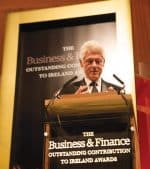Pictured: Mike Hayes, Global Climate Change and Decarbonisation Leader, KPMG
According to a KPMG Climate Change event that took place yesterday, there is low awareness of the EU carbon initiative, with only one in four business leaders surveyed aware of new EU Carbon Border Adjustment Mechanism (CBAM)
Low awareness amongst Irish business of the Carbon Border Adjustment Mechanism (CBAM), recently approved by the European Parliament and coming into effect from 1 January 2023, was one of the key findings emerging from a KPMG webinar on tax and climate change held on March 31 and attended by almost 100 senior business leaders.
Under the CBAM mechanism, high carbon goods being imported from third countries into the EU will face an additional level of taxation in order to avoid what is known as ‘carbon leakage’ – where cheaper high carbon goods are competing with more expensive low carbon goods in the EU. The mechanism is predicted to generate €14 billion in revenue in its first year.
Current awareness of CBAM amongst business leaders in Ireland appears to be low, with only 25 percent of attendees surveyed saying that they had heard of CBAM before. KPMG believes that this mechanism, which will initially apply to products such as aluminium, steel, fertilizers, cement and heavy chemicals, will be extended to wider products and industries following an initial pilot. KPMG strongly advises businesses to start preparing for the changes, beginning with ensuring businesses have an accurate measure of their carbon footprint across their product range.
Tax policy and climate change
Speakers at the webinar, held as part of KPMG’s Tax Leadership Series, included Pat Cox, Former President of the European Parliament and Mike Hayes, KPMG’s Global Head of Climate Change and Decarbonisation KPMG’s Global Head of Climate Change and Decarbonisation; Chris Morgan, Head of Global Tax Policy, KPMG International; Warwick Ryan, Excise & Environmental Taxes Centre of Excellence Leader, KPMG Australia and Ethna Kennon, Director, KPMG in Ireland. The webinar heard that tax policy in Ireland and globally is set to be substantially altered by the climate agenda, with tax incentivisation and punitive tax measures to change climate behaviours of both corporates and individuals expected in the near future.
Speaking at the webinar, Pat Cox, Former President, European Parliament, said:
“What we have seen in response to the Covid-19 pandemic – political polarisation, geopolitical diversity, nationalism, scepticism or denial of science – does apply equally to the climate change challenge. But unlike Covid, we have no vaccine for climate change and its impact will be permanent.”
Mike Hayes, Global Climate Change and Decarbonisation Leader, KPMG, added:
“The awareness and acceptance of the scale of the climate challenge has never been higher and there is a coming together of corporates, investors and individual citizens to say now is the time to tackle this crisis head on. COP 26, which will be held in Glasgow in November this year, is the opportunity of the decade for real action to be taken.”
Business believes tax should play a role in driving climate change action
There was consensus amongst those surveyed that tax policy should play some role in driving action on climate change, with none of the view that tax had no role. Almost half (49 percent) are of the view that tax policy should play a significant role in driving action on climate change with 51 percent of the view that tax should play somewhat of a role. KPMG is advocating the view as part of the drumbeat to the next UN Climate Change Conference of the Parties, COP 26, that serious consideration should be given to using tax policy as a tool to fight climate change.
The preferred tax policy measures indicated by those surveyed included the introduction of new tax incentives (37 percent), carbon taxes (34 percent) and more support for climate R&D incentives (29 percent).







